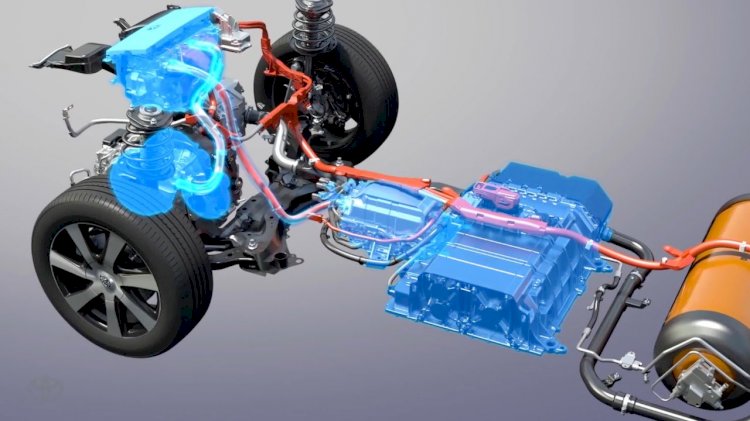India Hydrogen Fuel Cell Vehicle Market Size Zooming More Than 4X to Touch USD 348 Million by 2029
BlueWeave Consulting, a leading strategic consulting and market research firm, in its recent study, estimated the India hydrogen fuel cell vehicle market size at USD 80.36 million in 2022. During the forecast period between 2023 and 2029, BlueWeave expects the India hydrogen fuel cell vehicle market size to grow at a robust CAGR of 27.66% reaching a value of USD 347.85 million by 2029.

BlueWeave Consulting, a leading strategic consulting and market research firm, in its recent study, estimated the India hydrogen fuel cell vehicle market size at USD 80.36 million in 2022. During the forecast period between 2023 and 2029, BlueWeave expects the India hydrogen fuel cell vehicle market size to grow at a robust CAGR of 27.66% reaching a value of USD 347.85 million by 2029. Major growth drivers for the India hydrogen fuel cell vehicle market include an increasing demand for eco-friendly transportation solutions to address environmental concerns. The market has recently witnessed prominent players including Tata Motors and Ashok Leyland showcasing heavy-duty trucks with H2ICE technology at the Auto Expo. Additionally, Omega Seiki Mobility is venturing into hydrogen fuel cell technology by developing a three-wheeler powered by fuel cells, set to be launched by mid-2024. The projected advantages of hydrogen technology, such as longer driving ranges, shorter charging times, and regenerative braking, have fueled interest and investments in the sector. The Government of India proactive approach in supporting hydrogen fuel cell technology and its commitment to the National Green Hydrogen Mission has created a conducive environment for companies like Omega Seiki Mobility to invest in hydrogen-based projects. Collaborations with institutions like IIT Ropar further aim to localize the technology and bring down costs, making it more accessible for the mass market. Although the hydrogen fuel cell vehicle market is currently in its early stages in India, the potential for growth and innovation is promising. With advancements in fuel cell technology, increasing availability of hydrogen infrastructure, and growing consumer awareness about sustainable transportation options, the market is expected to witness significant expansion in the coming years. However, high initial costs and limited infrastructure are anticipated to restrain the overall market growth during the period in analysis.
India Hydrogen Fuel Cell Vehicle Market – Overview
India hydrogen fuel cell vehicle market refers to the segment of the automotive industry that focuses on vehicles powered by hydrogen fuel cell technology. These vehicles utilize hydrogen gas stored in fuel cells to produce electricity, which powers the electric motor, providing propulsion. The technology offers a cleaner and more sustainable alternative to traditional internal combustion engine (ICE) vehicles as they emit only water vapor as a byproduct. The Indian government's support and initiatives to promote hydrogen fuel cell technology have contributed to the growth of this market, with increasing interest from both manufacturers and consumers in adopting these eco-friendly vehicles for a greener and more efficient transportation future in the country.
Sample Request @ https://www.blueweaveconsulting.com/report/india-hydrogen-fuel-cell-vehicle-market/report-sample
Impact of COVID-19 on India Hydrogen Fuel Cell Vehicle Market
COVID-19 pandemic had a mixed impact on the India hydrogen fuel cell vehicle market. The initial lockdowns and restrictions disrupted the supply chain, delayed projects, and affected investments. However, the pandemic also highlighted the importance of sustainable energy solutions, leading to increased interest in hydrogen fuel cells. Post-pandemic recovery efforts prioritized green energy, presenting opportunities for market growth. The government's focus on economic revival and clean energy initiatives supported the sector's rebound. Despite challenges, the pandemic accelerated awareness of environmental concerns, making hydrogen fuel cells a potential key player in India's sustainable energy future.
India Hydrogen Fuel Cell Vehicle Market – By Technology
Based on technology, the India hydrogen fuel cell vehicle market is split into Proton Exchange Membrane Fuel Cell (PEMFC) and Phosphoric Acid Fuel Cell segments. The proton exchange membrane fuel cell (PEMFC) segment holds the highest share in the India hydrogen fuel cell vehicle market by technology. PEMFCs offer high efficiency, quick start-up times, and low operating temperatures, making them suitable for automotive applications. They provide better power-to-weight ratio, faster refueling times, and longer driving ranges compared to other fuel cell types. Additionally, PEMFCs can operate efficiently at partial loads, making them ideal for variable power demands in vehicles. The technology's ongoing advancements, government initiatives, and increasing investments in the hydrogen infrastructure further contribute to the dominance of PEMFCs in the Indian market.
Competitive Landscape
Major players operating in the India hydrogen fuel cell vehicle market include Larsen & Toubro (L&T), Adani Enterprises, Audi AG, Ceres Power, Cummins Inc., Daimler AG, Doosan Group, Ford Motor Co., Groupe Renault, Honda Motor Co. Ltd, Hydrogenics, Hyster-Yale, Hyundai Group, National Thermal Power Corp, Nissan Motor Co. Ltd, Tata Motors Ltd, Toshiba Corp., Toyota Motor Corp., and Volvo Group. To further enhance their market share, these companies employ various strategies, including mergers and acquisitions, partnerships, joint ventures, license agreements, and new product launches.
Contact Us:
BlueWeave Consulting & Research Pvt. Ltd
+1 866 658 6826 | +1 425 320 4776 | +44 1865 60 0662






























